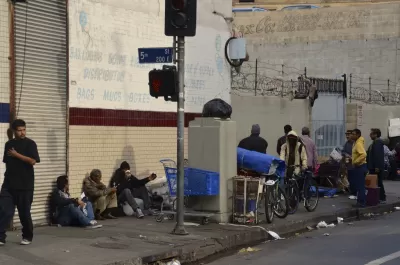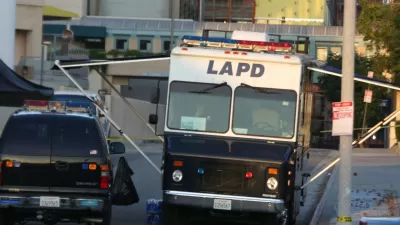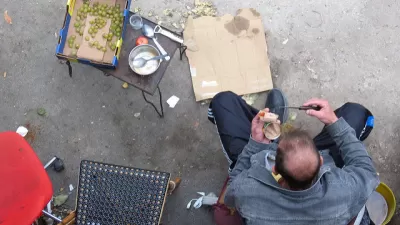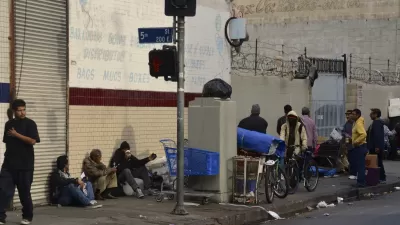As the city considers new ordinances making it easier for police to break up homeless camps, residents say forced displacement is already underway. Police deny an increase in homeless sweeps.

Aid groups for the destitute of Skid Row are concerned about a reported rise in homeless sweeps and property confiscation. "While city officials have been wrestling with new ordinances to make it easier to break up camps — first enacting them in July, then suspending enforcement while they consider modifications — police have been testing strategies for getting homeless people's property off the streets, the groups say."
One homeless man recalled an incident where "two 'officers' — employees of the local business improvement district — [...] pulled out a 'voluntary property release' form. Unsure if the black-shirted officers were police, Gabel said he felt intimidated and signed the form." The men then took away the bike parts he planned to sell.
Spokespeople for the police deny using more aggressive tactics on Skid Row. "LAPD Cmdr. Andy Smith said there has been no increase in homeless sweeps, and arrests for violations that typically target homeless people are down."
"[A police spokesperson] said police were trying to balance the needs of the homeless while ensuring the city is 'habitable.'" Habitability, of course, can easily be a code-word for the gentrification many see as inevitable for the area. In the words of one officer, "People pay a lot now to live here, they expect services from the city. You're kind of stuck in the middle, I know."
FULL STORY: LAPD denies increase in homeless sweeps; skid row advocates say otherwise

Alabama: Trump Terminates Settlements for Black Communities Harmed By Raw Sewage
Trump deemed the landmark civil rights agreement “illegal DEI and environmental justice policy.”

Study: Maui’s Plan to Convert Vacation Rentals to Long-Term Housing Could Cause Nearly $1 Billion Economic Loss
The plan would reduce visitor accommodation by 25% resulting in 1,900 jobs lost.

Planetizen Federal Action Tracker
A weekly monitor of how Trump’s orders and actions are impacting planners and planning in America.

Waymo Gets Permission to Map SF’s Market Street
If allowed to operate on the traffic-restricted street, Waymo’s autonomous taxis would have a leg up over ride-hailing competitors — and counter the city’s efforts to grow bike and pedestrian on the thoroughfare.

Parklet Symposium Highlights the Success of Shared Spaces
Parklets got a boost during the Covid-19 pandemic, when the concept was translated to outdoor dining programs that offered restaurants a lifeline during the shutdown.

Federal Homelessness Agency Places Entire Staff on Leave
The U.S. Interagency Council on Homelessness is the only federal agency dedicated to preventing and ending homelessness.
Urban Design for Planners 1: Software Tools
This six-course series explores essential urban design concepts using open source software and equips planners with the tools they need to participate fully in the urban design process.
Planning for Universal Design
Learn the tools for implementing Universal Design in planning regulations.
Caltrans
Smith Gee Studio
Institute for Housing and Urban Development Studies (IHS)
City of Grandview
Harvard GSD Executive Education
Toledo-Lucas County Plan Commissions
Salt Lake City
NYU Wagner Graduate School of Public Service





























